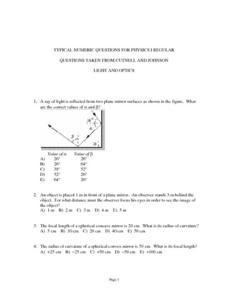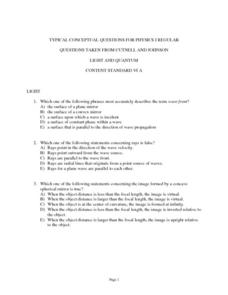Physics Classroom
The L.O.S.T. Art of Image Description - Converging Lenses
Magnifying glasses and cameras often use converging lenses, but how do they alter an image? Pupils discover a lens, axis, and object arrow before identifying four characteristics of the resulting image. They label the location,...
Physics Classroom
The L.O.S.T. Art of Image Description - Curved Mirrors
We see curved mirrors every day in spoons, rear-view mirrors, stores as a safety measure, make-up mirrors, and in novelty stores. Scholars explore the changes to an image based on the curve of the mirror, the location of the image, and...
Curated OER
Typical Numeric Questions for Physics I - Light and Optics
Nineteen word problems dealing with frequency, speed, reflection, and refraction of light are provided here. Empower your physics masters to manipulate equations for computing angles, focal lengths, image heights, and more! This is a...
Curated OER
Typical Conceptual Questions for Physics I - Light and Quantum
This is a stellar overview of everything light and quantum! There are 30 multiple choice questions, none of them requiring any mathematical computation. There are a few diagrams to analyze: light rays striking reflective and refractive...
CK-12 Foundation
Microscopes: Focal Point
The 1590s saw the invention of the first compound microscope. Scholars learn about how microscopes work and how to properly focus one. The lesson stresses the science fields that use microscopes and the difference between electron...
Michigan Technological University
Giant Mirrors
Did you know some retailers use curved mirrors in their fitting rooms to make customers look thinner? Pupils view themselves in convex and concave mirrors to understand the difference. The resource includes big ideas for multiple age...
Bowels Physics
Special Case — Ray Diagrams
Add a ray of light to the class as young scientists learn important foundational concepts. Assist pupils with focal lengths as they study ray diagrams. Pupils review images and compare them to mirrored images before solving problems on...
Exploratorium
Touch the Spring
Concave mirrors and the images they produce are traditional topics in the physics classroom. This resource explains how to set up an investigation of them, and it provides you with the explanation of concepts.
Exploratorium
Hot Spot
Not only does a concave mirror focus light waves, it can also concentrate infrared radiation into a hot spot. If you have a small electric heater and such a mirror, demonstrate this for your physical science class.
Curated OER
Take-Home Midterm Exam #3, Part A
Let your physics learners take this electromagnetic radiation exam home to show what they know. You could also use it in class or assign it as a review. The content covers concepts pertaining to color, wavelength, frequency,...
Curated OER
Repeat After Me: Repetition in the Visual Arts
Students explore one of the techniques artists often use to highlight important elements within a painting's composition and to move a viewer's eye around the canvass from highpoint to highpoint.
Curated OER
Career: Designing a Room
Students apply previous knowledge to design their own great room. Using appropriate color schemes, they also consider room traffic patterns and furniture arrangements. While designing their areas, students give attention to placement...
Curated OER
Ray Diagrams - Mirrors
In this light rays worksheet, students draw the three rays necessary to determine the location of the image. This worksheet has 10 problems to solve.
Curated OER
Pennsylvania Dutch Hex Signs
Young scholars experience Pennsylvania Dutch culture and heretige as they identify and create Hex signs based on unity, focal point, nature and a personal meaning.















